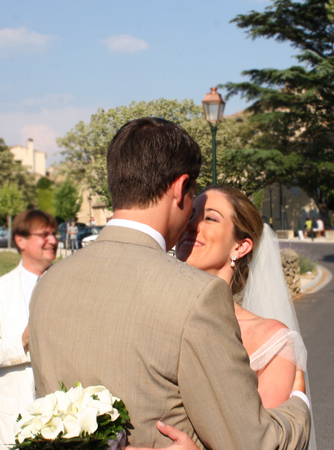Life Stages: Marriage
Waning Importance
Marriage does not hold any sacred or spiritual connotations in contemporary France. In fact, marriage serves only as one of the physical and emotional bonding methods French couples employ. Many couples dispense with marriage altogether and continue to cohabit. In present-day France, the marriage rates fall as the marriage age rises. The current average marriage age is 30 for men and 28 for women. As the importance of formal marriages wanes in French society, those who choose to marry often consider the institution an essential, long-term physical and emotional bond important to the rearing of children.
Marriages take place in France at a civil ceremony first, followed soon after by a religious ceremony, if the couple has a religious inclination. The mayor, who usually officiates at the civil ceremony in smaller towns, gives the married couple the livret de famille (the marriage certificate). Since the religious ceremony takes place soon after the civil one, the whole wedding party usually makes the trip from the town hall to the church. After both ceremonies, a banquet ensues; if the marriage takes place in a village, up to 300 guests may participate. The family usually serves vin d'honneur as an aperitif, followed by the main banquet.
The traditional perceptions of men as breadwinners and decision-makers and women as homemakers have no relevance in modern French society. Both parents have equal responsibilities in the care and upbringing of children, and women have an equal say in decisions within the marriage. The Ministry of Parity and Equality protects the legal rights of women within marriage. French women have equal rights under family law, property law, and in the judiciary as a whole.
Newly married couples (or newly cohabiting couples) generally set up house by themselves. Despite the fact that parents and in-laws have very little say in their children’s marriages, and despite their limited involvement beyond attending the wedding ceremony and banquet, family relations bear more importance to the French people than to many other Europeans. Married children often live close to their parents to maintain plenty of interaction between them.
French Practices
The French culture accepts extramarital affairs as common, and even men display a tolerant attitude toward their wives’ extramarital peccadilloes. Polygamy was banned in France in 1993, but it is still in practice among the North African communities.
French society permits divorce and makes it available on several grounds, including mutual consent. In divorce by mutual consent, a divorce can be granted in one hearing before a judge. In the case of contested divorces, the period of required separation has been reduced to two years from six. Women enjoy the same rights as men during and after divorce. No cultural impediments exist to prevent remarriage of divorcées (or widows) in France.
In the event of divorce, the judge grants custody of children to the father or mother (or to a third party) according to the best interests of the child. Spouses have the right to alimony, and no fault-based stigmatizing of either spouse transpires during divorce proceedings.
Same-Sex Marriage
France recognizes same-sex marriage. France passed a law allowing same-sex couples to marry in 2013, and the first same-sex marriages in the country took place on May 29, 2013. Same-sex marriage in France is treated in the same way as opposite-sex marriage, and same-sex couples have the same rights and responsibilities as married opposite-sex couples, including the right to adopt children.
It's worth noting that prior to the legalization of same-sex marriage in France, same-sex couples were able to enter into civil unions, which granted many of the same rights and responsibilities as marriage but did not allow them to marry in a religious ceremony or adopt children.
Copyright © 1993—2025 World Trade Press. All rights reserved.

 France
France 

